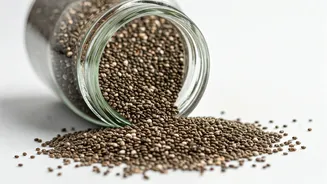Digestive Distress Alert
Chia seeds, renowned for their high fiber content, can sometimes trigger digestive problems. While fiber is vital for gut health, a sudden increase can lead
to discomfort for some. Individuals prone to bloating, gas, or constipation, especially those not accustomed to a high-fiber diet, should start with small amounts. It is crucial to gradually increase chia seed intake and stay hydrated. This helps the body adjust to the increased fiber, mitigating potential adverse effects. Listen to your body and adjust your intake accordingly to avoid digestive upset. Also, it is very important to ensure you consume enough water when taking chia seeds to aid digestion and prevent issues like constipation. Incorporating chia seeds slowly gives your digestive system time to adapt.
Blood Thinner Precautions
Chia seeds possess properties that can act as a natural blood thinner. This can pose risks for people on blood-thinning medications, such as warfarin or aspirin. Combining chia seeds with these medications could heighten the risk of bleeding. If you're taking blood thinners, consulting your healthcare provider before consuming chia seeds is essential. They can advise on a safe intake level based on your specific medical condition and medications. Always prioritize your health by seeking professional medical advice. It is always wise to inform your doctor about all supplements and foods you consume to maintain optimal health, and the same goes for Chia seeds.
Allergy Awareness Needed
Although rare, chia seed allergies can occur. Symptoms can range from mild skin rashes to more severe reactions like difficulty breathing. If you suspect you're allergic, avoid chia seeds and seek medical attention immediately. Individuals with known allergies to other seeds or plants should be especially cautious. Start with a very small amount of chia seeds to gauge your body’s reaction. Watch out for any signs of an allergic reaction. Be vigilant for any itching, swelling, or digestive upset. Moreover, an allergy test can help determine if you are sensitive to chia seeds. Always prioritize your health and consult a doctor if you suspect an allergy.
Low Blood Pressure Concerns
Chia seeds might lower blood pressure, which can be beneficial for some, but it presents a risk for individuals with already low blood pressure or those taking blood pressure medications. Combining these with chia seeds might cause blood pressure to drop excessively, leading to dizziness or fainting. Consulting a healthcare provider is essential if you have low blood pressure or take blood pressure medications. They can advise on safe intake levels and monitor your condition. Always ensure your health is prioritized by following medical advice. Regular monitoring of your blood pressure can help you manage your health while enjoying chia seeds. Be aware of any symptoms such as lightheadedness or fatigue.
Prostate Cancer Considerations
Some studies suggest a potential link between chia seed consumption and prostate cancer. While research is ongoing and inconclusive, men with a history of prostate cancer or those at high risk should be cautious. Discuss chia seed intake with your doctor to assess potential risks based on your health profile. It is best to err on the side of caution. Furthermore, staying informed about the latest research findings in this area is important. You should regularly consult your healthcare provider for the most up-to-date information. Maintaining open communication with your doctor will allow you to make the most appropriate decision based on your health needs.














